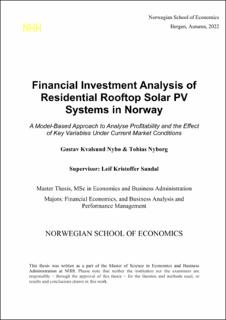Financial Investment Analysis of Residential Rooftop Solar PV Systems in Norway : A Model-Based Approach to Analyse Profitability and the Effect of Key Variables Under Current Market Conditions
Master thesis
Permanent lenke
https://hdl.handle.net/11250/3053630Utgivelsesdato
2022Metadata
Vis full innførselSamlinger
- Master Thesis [4372]
Sammendrag
In light of increased electricity prices and high demand for renewable energy, solar PV
deployment has risen rapidly and is expected to increase further, both globally and in
Norway. Although a large part of the growth is related to utility-scale parks, rooftop systems
on houses represent a significant potential for future deployment. Consequently, this thesis
aims to build a general model for evaluating the profitability of residential rooftop solar PV
systems in Norway. The profitability is not evaluated for specific projects but typical
residential projects in Norway.
The profitability question is evaluated using the net present value method. A cash flow
model is developed for typical solar PV systems in six Norwegian cities. Initial investment
costs are estimated from regressions on installation offers collected in the fall of 2022.
Future electricity price scenarios are constructed using a combination of Nasdaq futures
prices and long-term market analyses from NVE and Statnett. Sensitivity analyses are
performed for variables like electricity price, initial investment cost, cost of capital, and
share of generated electricity consumed internally.
The thesis concludes that residential rooftop PV systems in Norway are not profitable unless
electricity price scenarios well above historical prices are assumed. The geographic
differences are strongly apparent, with the most profitable profiles located in Oslo,
Kristiansand, and Bergen and the least profitable profiles located in Tromsø. The geographic
differences are driven by meteorological conditions and differences in investment costs. Out
of the variables that can be affected by the project owner, we found that the share of
generated electricity consumed internally is the variable with the highest effect on
profitability. We also argue that a reduction in investment cost is likely due to temporary
high prices. This would have a strong positive impact on the profitability analysis.
